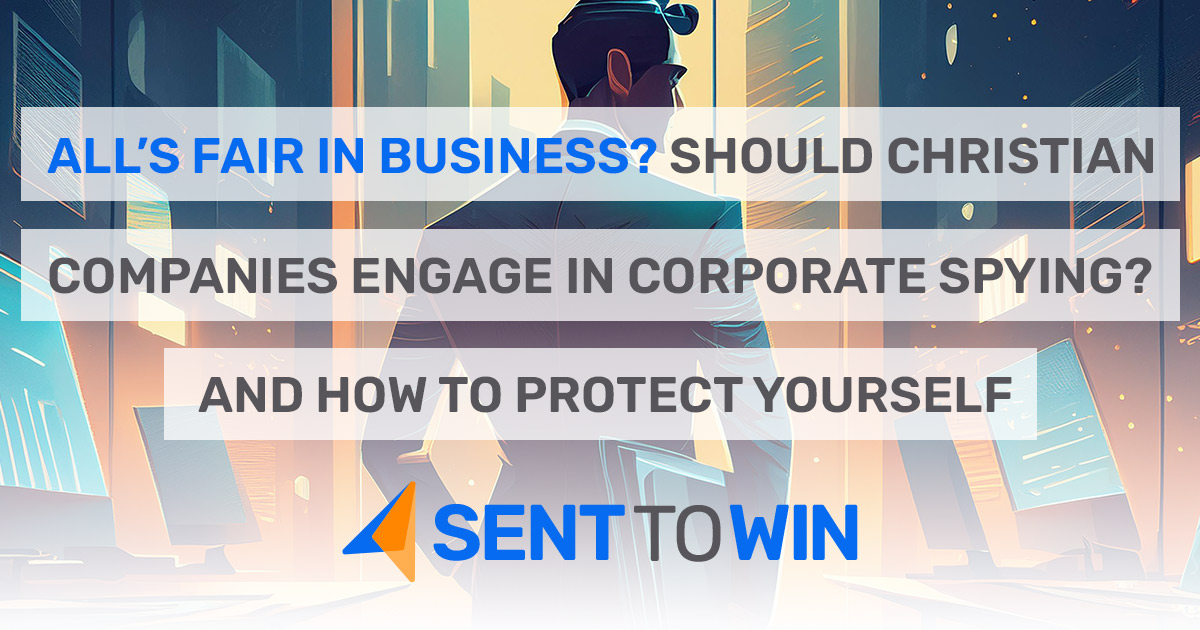All’s Fair in Business? Should Christian Companies Engage in Corporate Spying? And How to Protect Yourself
In today’s newsletter:
- All’s Fair in Business? Should Christian Companies Engage in Corporate Spying? And How to Protect Yourself
- Elon Musk, Market Watch, and TikTok the App Is Dead?
- Opening Your First Storefront? Here’s What You Need to Know
Amazon has recently gotten itself in a little bit of hot water.
And by “hot water,” I mean their elaborate, decade-long corporate espionage project was blown wide open by The Wall Street Journal in the middle of a massive antitrust lawsuit against the company.
To make a long story short, Amazon ran an international shell company called “Big River Services International” that created brands, purchased discount products, and sold said products through various rival platforms and logistics services, in order to gain access to private information, benchmarks, and rival innovations before these things became publicly available.
It isn’t a fabulous look for the e-commerce giant.
Yes, all serious brands do research on their competitors. Walmart executives take a spin through Target on occasion, and they pay close attention to press releases, real estate purchases, etc. This is legal, prudent, and no problem. The line between research and corporate espionage gets crossed when a company intentionally misrepresents itself in order to gain access to not-publicly-available information. Anyone can log onto eBay and see how the process works to buy a product; not everyone can attend eBay’s Las Vegas seller’s convention, where top vendors are rewarded for the business they bring in with information about coming changes to the platform and have the opportunity to ask top executives about eBay’s strategy and proprietary numbers.
It brings up two important questions for Christian business owners:
1) Is it ethical to spy on competitors for the sake of competitive advantage?
2) How can we stop our competitors from doing the same thing to us?
Is It Ethical to Spy?
Jesus’ Golden Rule is well known in Christian circles: “Do unto others as you would have them do unto you.” Lesser known is the Jewish tradition called the “silver rule,” which postulates the other side of the coin: “Do not do to others that which is hateful to you.”
In other words, the mere fact that we ask question number 2 ought to give us insight into the answer to question number 1. We don’t want others to connive and spy on us, so we shouldn’t do that either.
Now, competition, by its very nature, involves striving against someone else. If you are engaged in a friendly boxing match, you are not being immoral by striking the other man in the face while trying to avoid being struck yourself. That’s the game, after all, and you want him to play well, so you ought to play well also. But “the game” of business does not necessarily involve driving each other out of business at all costs. Boxing is a zero-sum game because there can only be one winner. Business is not that way – a win for you does not necessarily mean a loss for someone else.
“Be wise as serpents and gentle as doves” is a good general rule for life. As business leaders, we need to be prudent, innovative, and even clever. If that means keeping tabs on the competition, so be it. But we have to admit that we go too far in our zeal for success when competition means lying or misrepresenting ourselves.
Christians can honor Christ when they fight, but this isn’t love or war – so let’s fight fair. Business is a gentleman’s agreement.
How Can We Keep From Being Spied On?
First of all, we have to be pragmatic. We live in a digital age, and computers are a big part of what we do every day in most of our industries. That said, if the computer is on a network, it is vulnerable to being hacked. Bigger companies face the prospect of ransomware attacks, while smaller players can still fall prey to identity theft, data theft, or other forms of intellectual property theft. You wouldn’t leave your storefront unlocked after hours, so why would you not invest in some sort of cybersecurity protection?
Secondly, we have to be the type of people that evoke loyalty. There is an old story about how China’s enemies shouldn’t have ever been able to breach the Great Wall, yet it was done many times because a disloyal guard was bribed by the enemy. Peter’s epistles talk about being above reproach so that even if a charge is brought against us, the accuser seems foolish because others can see our righteous ways. Paul says to seek to live peaceably with all men. You can’t control others, but you can be a good, caring person who lifts people up – and suddenly, the threat of employee sabotage goes down. This brings up a wonderful side-effect of being obedient to God’s way, as revealed in the scriptures and specifically in the teaching of Jesus: It is, in the long term, good business.
Third, we have to admit that we live in a world that values openness and transparency, and there is a lot of expectation from the market that companies should not hold secrets. Whether that is right or not is a discussion for another day, but it’s worth mentioning that it is. Are there ways that your business is overly reliant on something staying secret? How could you run your business so that your secret getting out wouldn’t ruin you? Certainly, some things should always remain private – customer data, for instance – but is there a way to grow the pie rather than just fighting over pieces of it? Home Depot and Lowes, for example, have realized that rather than focus on trying to outdo each other, it makes more sense to place their stores right next to each other, trusting that the larger footprint of the hardware/construction supply industry in a city will turn into more business for both of them. (This is, in part, known as the “Cluster” strategy.)
TL;DR
Amazon got caught with its hand in the cookie jar, and for Christians in business, we should never find ourselves in that position. Prudent research becomes corporate espionage once fraud or bribery enters in, and Christians should have “no fellowship with the unfruitful works of darkness, but instead expose them.” Meanwhile, putting cybersecurity protocols and programs into place is crucial in today’s digital economy, and each of us should strive to evoke loyalty from our employees and, whenever possible, grow the pie. A rising tide lifts all ships, after all.
INDUSTRY INSIGHTS
Elon Musk, Market Watch, and TikTok the App Is Dead?
Elon Musk
Elon Musk might have the most stressful job(s) on the planet. He is presently serving as founder, chairman, CEO, and CTO of SpaceX; CEO and product architect of Tesla; owner, executive chairman, and CTO of X; founder of Boring Company; co-founder of Nueralink (which puts computer chips in people’s brains), and co-founder of Open AI (though he walked away from his position at Open AI and is currently suing them). He is dealing with investor dissatisfaction at Tesla by trying to solve autonomous driving in the short term amid plunging stock prices (though prices are up slightly after the last earnings call with a new development in the Chinese market) and an SVP with 18 years at the company resigning and selling over $180 million worth of stock. He is in a serious feud with the nation of Australia over free speech, and if it wasn’t enough to be at odds with one country, the government of Brazil has also been quarreling with Musk about censorship of late. It boggles the mind how influential this single individual is. Whether you love him or hate him, praying for Elon Musk is a good idea. The guy’s got a lot on his plate. How does he pull it all off? And is there anything we can learn from how he manages to juggle it all? Reportedly, he blocks out his day in 5-minute, task-oriented increments. Also, his typical workweek is 70-80 hours, although after buying Twitter, he claims to have been working 120-hour weeks, with the hopes that he could pare that down eventually. In his words, “No one ever changed the world in 40 hours a week.”
Market Watch
Bitcoin continues a general downward trend since its high in mid-March of this year, currently selling for about $62k. Still, even with the $11k loss in the last six weeks, BTC is up 40% this year. Ethereum’s price chart looks similar to Bitcoin’s, as usual, and has also been sliding downward from its high of over $4k in mid-March to its current price of $3,100. Still, it is up 33% YTD. Mortgage rates continue to rise, hitting a new high for the current year above 7.6%. Lawmakers are signaling an attempt, once again, to drive Wall Street out of the single-family home market. The Wall Street Journal reports that inflation is moving in the wrong direction, which will affect the Fed’s willingness to cut interest rates. GDP growth has slowed as well, posting just 1.6% in the first quarter. The dollar, meanwhile, remains strong and is rapidly approaching parity with the Euro.
TikTok the App Is Dead?
Last week, President Biden signed a large spending bill that included a provision giving ByteDance, the Chinese-backed company that owns TikTok, nine months to sell the company to a non-Chinese buyer, or the app will be banned. TikTok is viewed by many politicians on both sides of the aisle as being a dangerous domestic spying and propaganda op perpetrated by the Chinese government. The app is still running as normal at the moment, and for its part, ByteDance says that they will not sell their social media app and that they plan to fight the judgment in court. If, however, ByteDance changes its tune – amid questions of standing, since ByteDance is not a U.S. company and not subject to the same rights and privileges as domestic firms – the app may be worth $100 billion, and possible buyers could include Walmart, Microsoft, or Oracle – all for the prize of TikTok’s impressive, proprietary algorithm.
Sunday School
Q. Which books of the Bible are known as the “pastoral epistles”?
A. 1 Timothy, 2 Timothy, and Titus. Occasionally, some people will also include Philemon because it is a letter addressed to a single individual.

Negotiations broke down after that. Apparently, she had, in fact, inherited the building.
TIPS & TRICKS
Opening Your First Storefront? Here’s What You Need to Know
We do a lot of business in the digital world on platforms such as Amazon, Walmart, or even our own websites and apps. Nevertheless, we live in the real world, and the need for a physical presence, in many industries, is a necessity that is never going to go away.
If you are opening a brick and mortar location, there are a few things it’s helpful to know before you take the plunge.
Different Types of Commercial Leases
The first thing you need to know is that not all leases look the same, and you should familiarize yourself with the possibilities. Today, Triple Net (NNN) and Modified Gross may be the most common types of commercial leases currently available, though this will depend on what kind of building you are looking to rent, as well as the area where you are doing business.
Rent is usually calculated on the basis of cost per square foot per year. So, if the cost per square foot is $25 and the unit is 2,000 sq. ft., you would be paying $50,000/year to lease the space, or just over $4k a month. This is simple enough, but there is the matter of insurance, utilities, repairs, tenant improvement (T.I.) and common area maintenance (C.A.M.) that can cause that monthly bill to sharply increase.
Here’s what that can look like in two common lease agreements:
A Triple Net Lease is essentially a situation in which the landlord who owns the entire property, let’s say a strip mall, passes all of the fees, insurance costs, and common area expenses to the tenants, proportional to how much square footage they are renting. In this case, you would pay a C.A.M. fee of somewhere around $4-5 per square foot per year to cover landscaping costs, repairs to the parking lot or street lights, etc. Property taxes and general insurance costs are usually not included in this number, so check your lease offer for details. On the plus side, triple net leases often offer T.I., which is a reimbursement of some or all of your renovation expenses that you incur while setting up your physical location.
A Modified Gross, on the other hand, is a form of a gross lease, where the landlord is going to absorb some of the costs of ownership and rely on simple rent payments to pay the building expenses. In many cases, the tenant in a modified gross commercial lease will not have to pay CAM fees or insurance but will still have to pay for utilities, and the landlord might be less open to providing T.I. funds, so it is more likely that you will be on the hook for your own construction/renovation costs here. The good news, however, is that your expenses will be more predictable.
There are other types of commercial leases available, so make sure and read up on them before you start submitting letters of intent.
How to Negotiate
Renting a commercial space is not like buying a pair of shoes from a local outlet. It’s more like buying a car. There is a certain amount of haggling over the particulars.
Having an empty space in a commercial building is a big drag on the landlord’s cash flow, and a potential tenant has some degree of leverage. Be sure to work with a commercial real estate agent and read up on negotiation strategies in a commercial setting, but here are a couple of things to know upfront:
Supply and demand still apply. If the space you want to lease is highly sought-after, in a high-traffic area, and if it has not been vacant for long, you are going to have a harder time getting concessions out of the landlord. That said, certain accommodations are regarded as common practice, and you just need to ask.
For example, “rent abatement” (not having to pay rent) is something that isn’t too hard to get for the period when you first move in and begin renovations. If your doors aren’t open for business yet, the landlord is usually understanding and will often grant a month or two of free rent so you can get up and running. They want you to be successful, because a successful business means a reliable source of rent every month.
Also, even when you do not have to do extensive renovations, you can negotiate to have rent abatement for a few months upfront in exchange for a back-end payment on the lease, giving you time to establish your business in the meantime.
T.I. funds are negotiable, and in a situation where the space has been vacant for a while, you may even be able to get them to knock a few cents or dollars off of the cost per square foot. Good luck if you try to negotiate your way out of CAM fees, however – all the other tenants in a triple net situation pay them, and a landlord isn’t going to want to tick off his other tenants.
A Few Easy Resources
If you’re interested in finding a commercial space to lease, calling a trusted commercial real estate broker is a good first step. If you just want to see what’s out there, however, head over to Loopnet.com and put in your search criteria. It will tell you how much traffic passes by the location each day, what the lease terms are, and other pertinent information on available leases.
A business’ success is so often, as the old saying goes, all about location, location, location. So, you’ll want to check out demographic information on a given area with as much specificity as you can. You aren’t just looking at the median household income of Los Angeles County – a sprawling metropolis spread over a wide area – you want to zoom in on the neighborhood where your store could be. How is crime in that very particular area? How about income? Family size? Average age? You can use U.S. Census Bureau data or do a Google search, but keep in mind that copying the big guys is also a good strategy because large corporations spend hundreds of thousands or even millions of dollars on demographic research before committing to building a new location. Thus, if your business is going to rely on families with disposable income and more than one child, it’s a good idea to look for locations where an upper-scale grocery store has just been built or ask where Chik-fil-A is putting new restaurants these days.
Be smart, be flexible, and do your research so you can be poised for great success in your brick and mortar location.
Quick Hits
- If inflation has you down already, just skip this article on the average impact of inflation on your income.
- Amazon has successfully increased its delivery speed for Prime customers in 60 key metro areas after a heavy investment in fulfillment.
- Relevant Magazine urges Christian workers and businesspeople to take the command to rest on the Sabbath seriously.
- The Wall Street Journal reports, “The Dream of Fed Rate Cuts Is Slipping Away.”
- Walmart is removing self-checkout from two of its stores due to theft. This is the most recent generalized trend of retail brands scaling back on self-checkout for the sake of security.
Our “All’s Fair in Business?” graphic was generated using AI prompts. Guess the prompt for your chance to win Sent To Win gear. Just reply to this email with your best guess.
For Kingdom Leaders, By Kingdom Leaders
Bringing Kingdom-minded leaders like you fresh perspectives and insights on business, finance, and leadership trends.








